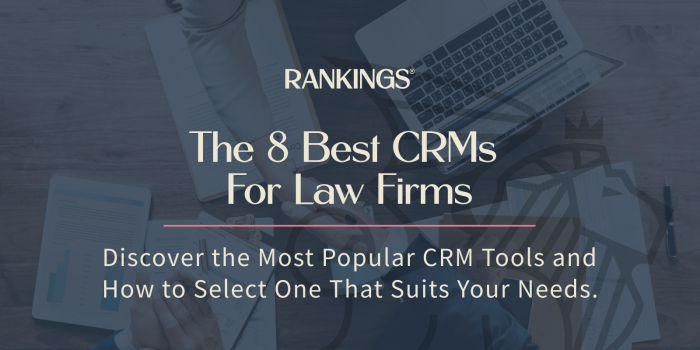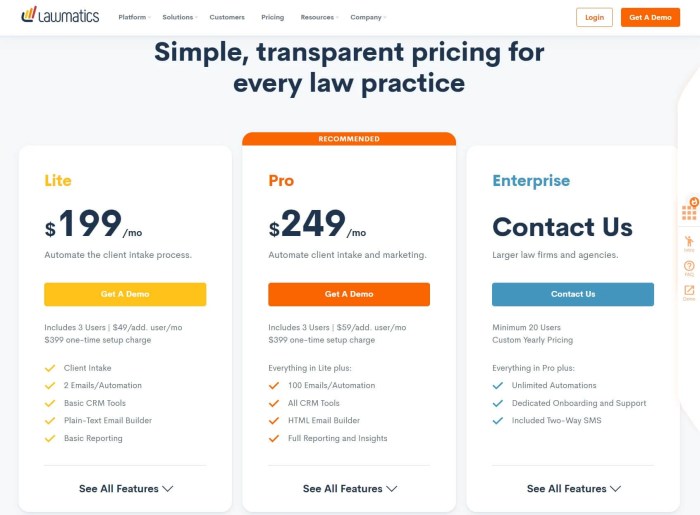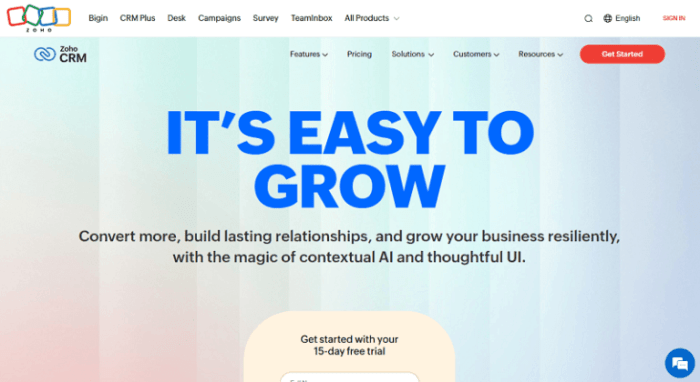Crm software for law firms – In today’s competitive legal landscape, efficient client management is paramount. Law firms, regardless of size, can significantly benefit from implementing a robust Customer Relationship Management (CRM) system. This detailed guide explores the crucial role of CRM software in modern law firms, outlining its benefits, key features, selection process, and frequently asked questions. We’ll also delve into specific CRM software options tailored for legal practices and provide insights into maximizing your investment.

Source: website-files.com
Why Law Firms Need CRM Software
Traditionally, law firms relied on spreadsheets, email chains, and disparate systems for managing clients, cases, and communications. This approach often leads to inefficiencies, missed deadlines, and a fragmented client experience. A dedicated CRM system offers a centralized platform to streamline operations and enhance client relationships. Here’s why it’s essential:

Source: contentmavericks.com
Improved Client Management
- Centralized Client Database: Access all client information – contact details, case history, communication logs – in one easily searchable location. This eliminates the need to sift through multiple files and emails.
- Enhanced Communication: Streamline communication through integrated email, phone, and messaging features. Maintain a consistent brand voice and ensure timely responses.
- Personalized Client Experience: Track client preferences and interactions to personalize communication and service delivery, fostering stronger client relationships.
- Improved Client Retention: Proactive communication and efficient case management contribute to higher client satisfaction and loyalty.
Streamlined Case Management
- Centralized Case Files: Store all case-related documents, communications, and deadlines in a secure, easily accessible location.
- Automated Reminders and Tasks: Reduce the risk of missed deadlines and ensure timely follow-up on tasks and appointments.
- Improved Collaboration: Facilitate seamless collaboration among team members on shared cases.
- Better Time Management: Optimize workflow and allocate resources effectively, leading to increased efficiency and profitability.
Increased Efficiency and Productivity, Crm software for law firms
- Automation of Repetitive Tasks: Automate routine tasks such as email marketing, appointment scheduling, and report generation, freeing up time for more strategic activities.
- Improved Reporting and Analytics: Gain valuable insights into firm performance, client behavior, and case outcomes through comprehensive reporting and analytics dashboards.
- Better Resource Allocation: Optimize resource allocation based on workload and case priorities.
- Scalability: Easily adapt to the growing needs of your firm as it expands.
Key Features of a Law Firm CRM
While general CRM systems offer many benefits, a legal-specific CRM provides features tailored to the unique needs of law firms. Essential features include:
Client and Matter Management
- Contact Management: Detailed contact information, communication history, and client relationship notes.
- Matter Management: Case details, deadlines, documents, and associated tasks.
- Conflict Checking: Identify potential conflicts of interest before taking on new clients.
- Document Management: Secure storage and retrieval of legal documents.
Communication and Collaboration Tools
- Integrated Email and Calendar: Schedule appointments, send emails, and manage calendars directly within the CRM.
- Secure Messaging: Ensure confidential communication with clients and colleagues.
- Team Collaboration Features: Facilitate teamwork and information sharing among legal professionals.
Reporting and Analytics
- Customizable Reports: Generate reports on key performance indicators (KPIs) such as client acquisition costs, case win rates, and attorney productivity.
- Real-time Dashboards: Monitor key metrics and track progress towards goals.
- Data Export Capabilities: Export data to other systems for analysis and reporting.
Legal-Specific Features
- Billing and Time Tracking: Integrate time tracking and billing functionalities for accurate invoicing.
- Compliance Features: Ensure compliance with relevant legal and ethical regulations.
- Integration with Other Legal Software: Seamless integration with case management software, document management systems, and other legal technologies.
Choosing the Right CRM for Your Law Firm
Selecting the right CRM involves careful consideration of your firm’s specific needs and budget. Here’s a step-by-step guide:
1. Define Your Requirements

Source: crmside.com
Identify your firm’s specific needs, including the number of users, required features, and budget constraints.
2. Research CRM Options
Explore different CRM solutions, comparing features, pricing, and user reviews. Consider both cloud-based and on-premise options.
3. Request Demos and Trials
Request demos from shortlisted vendors to assess the user interface, features, and overall usability. Utilize free trials to test the software in your own environment.
4. Evaluate Integrations
Ensure the CRM integrates seamlessly with your existing legal software and other essential tools.
5. Consider Scalability and Support
Choose a CRM that can scale with your firm’s growth and offers reliable customer support.
Popular CRM Software for Law Firms
Several CRM platforms cater specifically to the needs of law firms. Some popular options include:
- CaseText: Offers legal research, document automation, and CRM features.
- MyCase: A cloud-based legal practice management software with built-in CRM functionality.
- Clio Manage: A popular cloud-based legal practice management software with strong CRM capabilities.
- PracticePanther: A comprehensive legal practice management software with integrated CRM features.
- Salesforce: A highly customizable CRM platform that can be adapted to the specific needs of law firms (often requiring customization and potentially higher costs).
Note: This is not an exhaustive list, and the best CRM for your firm will depend on your specific requirements and budget.
Frequently Asked Questions (FAQ)
- Q: How much does CRM software for law firms cost? A: Pricing varies widely depending on the features, number of users, and vendor. Expect to pay a monthly or annual subscription fee.
- Q: Is CRM software difficult to learn? A: Most modern CRM systems are designed with user-friendliness in mind. Many offer training resources and support to help users get started.
- Q: Can CRM software integrate with my existing systems? A: Many CRM systems offer integrations with other software, including email clients, accounting software, and document management systems. It’s crucial to check compatibility before purchasing.
- Q: What are the security implications of using a CRM? A: Data security is paramount. Choose a CRM provider with robust security measures, including encryption and access controls. Ensure compliance with relevant data privacy regulations.
- Q: How can I measure the ROI of a CRM investment? A: Track key metrics such as improved client retention, increased efficiency, reduced administrative costs, and improved case win rates. Compare these metrics before and after implementing the CRM.
Conclusion
Implementing a CRM system is a strategic investment for any law firm seeking to enhance efficiency, improve client relationships, and boost profitability. By carefully considering your firm’s specific needs and selecting the right CRM software, you can unlock significant improvements in operational efficiency and client satisfaction. Don’t hesitate to explore the options available and choose the solution that best aligns with your goals.
Call to Action: Crm Software For Law Firms
Ready to transform your law firm’s client management? Contact us today for a free consultation to discuss your specific needs and explore the best CRM solutions for your practice.
User Queries
What are the key features to look for in CRM software for law firms?
Essential features include client relationship management, case management tools, document storage, calendar integration, reporting and analytics, and security features compliant with legal data protection regulations.
How much does CRM software for law firms typically cost?
Pricing varies widely depending on the features, number of users, and vendor. Expect a range from affordable monthly subscriptions for smaller firms to more substantial investments for larger firms with complex needs.
What is the best way to implement CRM software in a law firm?
Successful implementation requires careful planning, staff training, and data migration. A phased approach, starting with a pilot program, is often recommended. Consider engaging a consultant experienced in legal CRM implementations.
How can CRM software improve client communication?
CRM systems facilitate better communication through features such as automated email reminders, centralized communication logs, and integrated communication channels (e.g., email, phone, text).
